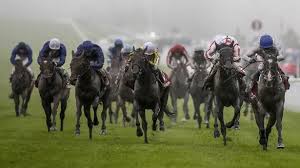Julie Harrington Joins Chester Race Company – Because Racing’s Revolving Door Must Keep Spinning
Of course, Harrington’s appointment is all part of the great British racing tradition of ensuring that once you’re in, you’re in.
Ed Grimshaw
2/17/20253 min read


You have to hand it to British horse racing. If there’s one thing the industry does better than most, it’s ensuring that the same names, faces, and talking points are shuffled about like a well-worn deck of cards in a Cheltenham hospitality box. And so, as predictably as a rainy Bank Holiday at Epsom, we welcome back Julie Harrington, the former British Horseracing Authority (BHA) chief executive, to the fold—this time in the plush non-executive director’s seat at Chester Race Company (CRC).
The announcement, as ever, is decked out in the usual trappings of corporate puffery. "Excited," "heritage," "forward-thinking approach," and "future ambitions" all make their contractual appearances, as if Harrington were preparing to take the reins of a Silicon Valley start-up rather than another panel seat in British racing’s eternal carousel of governance.
The Art of Leaving Without Really Leaving
For those keeping track (pun intended), Harrington stepped down from her role at the BHA at the end of 2024 after four years of what we might diplomatically call "steering the sport through turbulent times"—or, if we were being slightly less charitable, "presiding over a period of crisis and uncertainty while various factions bickered over who should actually be in charge."
Her tenure included navigating the Covid-19 pandemic, dealing with a governance structure so confusing it makes the House of Lords look like a model of clarity, and overseeing an "industry strategy" that has all the urgency and effectiveness of a government white paper on potholes. But fear not, for the former BHA supremo has landed safely on another board, joining CRC just in time for a few agreeable race-day lunches and some strategic musings on "enhancing the customer experience"—the corporate euphemism for working out how much more you can charge for a lukewarm pint of lager in a plastic cup.
Chester: A Racecourse With "Heritage" (And Other Such Vague Platitudes)
Chester, we are solemnly informed, is a racecourse with "a rich heritage." This is the sort of phrase that means absolutely everything and absolutely nothing in equal measure. It is certainly old, which in racing terms is apparently enough to qualify as "heritage," but let’s not pretend Chester is a sacred relic of sporting purity. It is, at heart, a city-centre knees-up for people who enjoy drinking Prosecco in uncomfortable shoes while shouting at an animal they have never seen before and will never see again.
Still, Chester is thriving, which in racing’s current economic landscape is something of a rarity. The company posted a very respectable pre-tax profit of £1.8 million last year—an achievement that likely owes more to its ability to extract cash from corporate hospitality clients than any grand vision for the future of the sport. Let’s not forget, this is a racecourse where the VIP section is often more competitive than the horses themselves.
The Great British Racing Circuit: An Endless Game of Musical Chairs
Of course, Harrington’s appointment is all part of the great British racing tradition of ensuring that once you’re in, you’re in. The same faces pop up in slightly different roles, at slightly different institutions, but the essential formula remains unchanged.
Her predecessor, Charles Barnett, had a similarly circuitous career path, having previously been in charge of both Aintree and Ascot before landing at Chester. Naturally, his time at CRC included the obligatory stint as an "interim chief executive" after the sacking of a predecessor for "misuse of company resources." Because no British racing executive’s CV is complete without at least one scandal-adjacent anecdote.
And now, with Barnett stepping aside, it is Harrington’s turn to take a seat in the committee room. No doubt her "strategic acumen" will be a key asset in guiding CRC through the treacherous waters of racecourse management, ensuring that the supply of overpriced champagne and increasingly elaborate dress codes remains uninterrupted.
What Next?
So, what exactly will Harrington’s role entail? One suspects it will involve a great deal of "shaping the future," a phrase that in racing governance usually translates to "attending meetings, approving modest tweaks to existing structures, and making sure that nobody rocks the boat too much."
And let’s not forget the golden rule: no one in racing administration ever really disappears. This is merely the latest chapter in what will almost certainly be an ongoing tale of boardroom reshuffles and carefully managed transitions. Give it a few years, and we’ll probably see Harrington pop up again, perhaps leading some new "strategic initiative" to engage younger audiences, or maybe overseeing a task force on the role of artificial intelligence in race-day stewarding.
Until then, let’s raise a toast to another seamless transition in the world of British horse racing governance. The faces may change slightly, but the game remains exactly the same.
